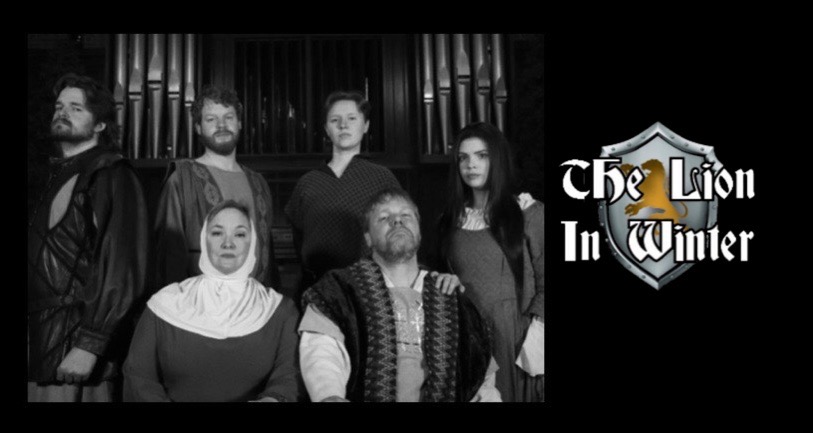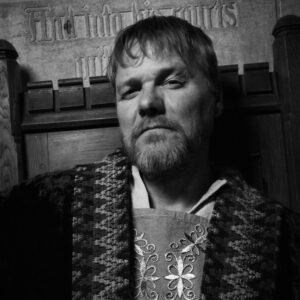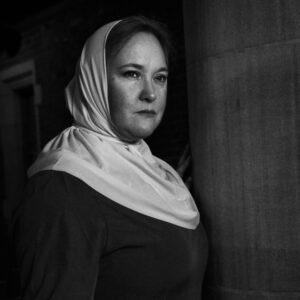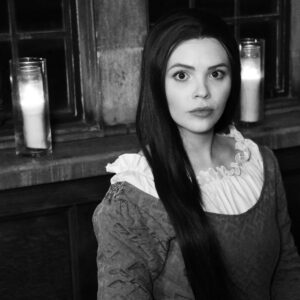
If memory serves, it’s been since 2009-nearly 15 years-since Nashville audiences have had the chance to see a theatrical presentation of The Lion in Winter. All that changes Friday, January 12 as Circle Players presents the James Goldman-penned retelling of a certain drama-filled Christmas of 1183 hosted by England’s King Henry II, his long-imprisoned but still willful wife, Eleanor of Aquitaine and their children as the fate of this successor dominates the occasion. Directed by Clay Hillwig, Circle’s The Lion in Winter features among its cast, Jack E. Chambers as Henry II, Kay Ayers as Eleanor of Aquitaine and Elizabeth Burrow as Alais Capet. Recently, as the director and cast were readying the show for Friday’s opening, I had the opportunity to pose a few questions to Hillwig, Chambers, Ayers and Burrow for the latest installment of my recurring interview feature, Rapid Fire 20 Q.
____________________
RAPID FIRE 20Q WITH DIRECTOR AND CAST OF CIRCLE PLAYERS’ THE LION IN WINTER
 RAPID FIRE WITH THE LION IN WINTER DIRECTOR, CLAY HILLWIG
RAPID FIRE WITH THE LION IN WINTER DIRECTOR, CLAY HILLWIG
JHPENTERTAINMENT: How did you come to direct The Lion in Winter for Circle Players?
CLAY HILLWIG: It appears to have been destiny. I had originally agreed to direct the play Clue in this same time slot, which would have been a lot of fun. But, due to a Broadway touring revival of the show, the rights became unavailable. The board then asked me to submit a list of shows that I would be interested in. After putting a list together, which included The Lion In Winter, I knew that this was the only show I really wanted to submit. So, I took a chance and only sent them this show. I then offered to meet with the board to share my vision and why I felt so strongly that this show should be a part of their season. Within the hour, I received a response that they were submitting for the rights. Like I said…destiny.
JHPENTERTAINMENT: What is is about this particular play that interests you as a director?
CLAY HILLWIG: I love plays that have a strong family dynamic. Even if the story is not necessarily directly centered around the family, I am generally moved with the relationship aspects of the story. A great example of this is The Godfather. While perceived to be a book and movie about organized crime, in reality the story was written about family. In this script, we see the power struggle within the royal monarchy, but the family relationships are the driving force within the story. Many of these same issues, can be found in the everyday lives of average families that we know or have experienced them first-hand within our own families. Parents struggling with their own marital issues. Children caught in between the two parents, all the while struggling to find their own identities in life. One of the most power scenes is the Father (Henry) and Son (Richard) conflict that many families know so well. One of the reasons that I felt strongly about the timing of putting this show up is the popularity of the HBO show Succession. The power struggle between the children within this media mogul family is very similar to what we see here in The Lion In Winter. Aside from the story line itself, it is the language is that I really love. Playwright, James Goldman has provided us with a script that is clever and very quick witted. It lends to some wonderful interaction between characters and pacing that keeps an audience engaged. Besides, how can you not love Henry and Eleanor of Aquitaine?
JHPENTERTAINMENT: Many audience members, myself included may primarily be familiar with the piece thanks to the 1968 film adaptation starring Katharine Hepburn and Peter O’Toole or perhaps the more recent 2003 Showtime remake starring Patrick Stewart and Glenn Close. When were you first made familiar with the play itself?
CLAY HILLWIG: In regards to the 1968 film, I saw this in the early 70’s as a teenager. Even then, I was fascinated with the characters and story line. And of course, the performances by both Katharine Hepburn and Peter O’Toole are in my opinion some of their finest work. It was an ACT I production directed by Melissa Williams that first introduced me to the stage version. Brian Hill played Henry and the wonderful Maggie Bowden played Eleanor. It was a wonderful production. I left the theater knowing that I either wanted to play Henry, direct this show or hope for opportunities to do both. Not in the same show of course. Now I am blessed to direct the show and to be jealous of Jack Chambers for playing Henry all at the same time.
JHPENTERTAINMENT: Playwright James Goldman based The Lion in Winter, at least in part, around Henry II and historical elements regarding his hopes of his successor. WIth that in mind, how important is it to you as a director to present the story as authentically as possible?
CLAY HILLWIG: It was important to me, to spend time in table reads and relationship building prior to putting the show on its feet. As part of our process, we spent a couple of weeks just working through the character dynamics of the script and how it relates to history. It was important for us to learn not only the events prior to our story, but also what was to come post-Christmas 1183. It was fascinating to learn where they had been and where the family ended up in history. Each actor was committed to taking it upon themselves, to learn everything they could about their characters place in history. In relation to how this plays on stage, we put full trust in the playwright. Goldman did a wonderful job of representing the entire family. Each individual is well represented as far as their place within the struggle for succession to the throne. In my opinion, he puts a real emphasis on the struggle that Henry had in his relationship with his sons and the decision of who would succeed him in greater detail than the movies previously mentioned did.
JHPENTERTAINMENT: What do you hope audiences come away from The Lion in Winter remembering about this production?
CLAY HILLWIG: One of the most important things that I hope with impact our audiences, is that there is still a place for classic pieces of theater. We seem to have moved to the newer shiny productions, often leaving creative gems such as The Lion In Winter, not given the attention they deserve.
 RAPID FIRE WITH JACK E. CHAMBERS, HENRY II IN THE LION IN WINTER
RAPID FIRE WITH JACK E. CHAMBERS, HENRY II IN THE LION IN WINTER
JHPENTERTAINMENT: What is your favorite aspect of Henry II as he’s written in the script of The Lion in Winter?
JACK E. CHAMBERS: I love that Henry is a warrior, but he’s a word-wielding warrior with intelligence, strategy, cunning, and deadly humor in addition to being an actual soldier. The language of the play, especially the interplay between Henry and Eleanor, is just outstanding — some combination of the banter of 1940s comedies and the razor-sharp merciless attacks of Succession. He’s described as a phenomenal warrior, but all of the joy in playing him is in the satisfaction of the language, especially offsetting the fact that he’s starting to fade physically.
JHPENTERTAINMENT: During your three decades+ career, you’ve appeared in a number of Circle Players productions. What is is about Nashville’s oldest continuing theatre company that keeps you coming back?
JACK E. CHAMBERS: Circle is a Community Theatre in the truest sense of the word. I know folks whose Circle time goes back decades further than my own, and mine goes back 30 years at this point. I love the “all are welcome” spirit of a true Community company, and really selfishly appreciate that over those years, Circle hasn’t just been doing Oklahoma or Arsenic and Old Lace over and over — half the shows I’ve done with them were Nashville premieres.
JHPENTERTAINMENT: On the subject of previous Circle shows, back in 2010, you appeared in a production of The Grapes of Wrath, directed by Clay Hillwig, who’s directing The Lion in Winter. Are you enjoying working with Clay again and how is he as a director?
JACK E. CHAMBERS: I haven’t gotten to work with Clay since then — you end up in different places and it happens sometimes, right? — but I loved getting to pick right back up with him. Something I love about Clay is that he has the vision to imagine beautiful things *and* the skills to make them happen at the same time. He’ll throw out high-concept stuff, big-picture stuff, and also “hey just try this one little tweak” ideas, which is great. And again selfishly, when we did Grapes, I was a musician in the show as well, and pitched a mini-concert to him; we got to play period songs all through pre-show and intermission, which was a blast.
 JHPENTERTAINMENT: As the central patriarch, you share the stage with Kay Ayers as Eleanor, Henry’s Queen, as well as Elizabeth Burrow, Henry’s rumored mistress. What’s been it been like sharing the stage with each of these actresses?
JHPENTERTAINMENT: As the central patriarch, you share the stage with Kay Ayers as Eleanor, Henry’s Queen, as well as Elizabeth Burrow, Henry’s rumored mistress. What’s been it been like sharing the stage with each of these actresses?
JACK E. CHAMBERS: I’ve known Kay for most of the years I’ve been in town — we did And Then There Were None together back in 1997 — and have loved playing off her. She’s a match for anybody physically or verbally, with wit and spirit and daring. She’s great. I just met Elizabeth this past year, and she’s been lovely; Alais is the single-most vulnerable character in the show, but shows crystal-clear understanding of the goings-on around her and true strength to persevere, and Elizabeth has nailed that balance. She’s a total charmer.
JHPENTERTAINMENT: A quick peek at your professional bio would indicate that throughout your stage career you’ve played a variety of characters often utilizing your prowess with varying dialects. The Lion in Winter being set in Medieval England in the year 1183, did the cast work with a dialect coach or were you each left to your own devices in that regard?
JACK E. CHAMBERS: I’d say it was some combination of “own devices plus tweaking as we went,” with additional discussions as required. Because we’re technically in Middle English, setting-wise, there’s a fascinating, not-historically-accurate-but-entertaining mix of Middle English, 20th century patter, anachronistic traditions, French terms and names and places, Shakespearean rhythms, Broadway Golden Age character types — it’s such a great stew. Although we didn’t work with a dialect coach, we did work with a linguistic consultant — a collaborator and friend of mine from college who’s an Old- and Middle English specialist — on people and place names, sources, literary origins for some of the references… it was fascinating!
 RAPID FIRE WITH KAY AYERS, ELEANOR IN THE LION IN WINTER
RAPID FIRE WITH KAY AYERS, ELEANOR IN THE LION IN WINTER
JHPENTERTAINMENT: In Circle Players’ The Lion in Winter, you play Queen Eleanor of Aquitaine. Iconic actresses Rosemary Harris, Joan Fontaine and Stockard Channing all starred in stage productions while Katharine Hepburn and Glenn Close lit up the big and small screens respectively in the role you’re now taking on. So, not only are you playing an actual historical figure, but one with a luminous stage and screen history. How excited are you to put your own spin on Eleanor?
KAY AYERS: Excited would be an understatement. Thrilled with a touch of gobsmacked is close to my emotion! When I received the casting call, I don’t think I spoke for 30 seconds. This really is a once in a lifetime chance. I’m so lucky that I’ve been given this opportunity. And yes, I’m experiencing a lot of nervousness to get this character “right”.
JHPENTERTAINMENT: The Lion in Winter marks a bit of a homecoming for you, having made your Nashville acting debut back in 1994 in a Circle Players production. What was the show and what’s it like to be back with the company where it all started?
KAY AYERS: The Three Musketeers in Circle’s 46th season was my introduction to Nashville theatre and to Circle in particular. My first audition and show were in TPAC’s Johnson Theatre, where I went on to perform in numerous productions. Coming back to perform at Circle was a goal of mine for some years now. The stars aligned perfectly! Walking into the rehearsal space I helped move into, set up, and clean brought back a flood of emotions. We’ve lost so many of those individuals who gave their heart and soul to Circle over the years. I’m just blessed to have known most of the “old guard” and to have gleaned knowledge over the years, making me into the actress I am today.
JHPENTERTAINMENT: In preparing to chat with you and your cast mates, I revisited the above mentioned 2003 telefilm. I love all the barbs and quick quips among the royals. Eleanor in particular has some great lines. My favorite, at least in the 2003 tv adaptation occurs in a scene involving Eleanor, John and Richard in which Richard threatens John with a knife. John says to their mother, “He has a knife”. Eleanor quickly replies, “We all have knives. It’s 1183. We are barbarians”. Do you have a favorite line in the show, whether it be yours or someone else’s?
KAY AYERS: Eleanor really does have the best lines! I relish several of those barbs she flings at her opponents! But one of the most deeply truthful lines, and weighty, is one that is delivered by Elizabeth Burrow, our enchanting Alais “I haven’t got a thing to lose: that makes me – dangerous.” It’s so telling. All the other characters have a twisted and complicated series of moves they’re making. And here Alais stands, ready to take them all on. Because she really doesn’t have anything to lose and everything to gain. It’s just a powerful line.
 JHPENTERTAINMENT: While you’ve shared the stage with Clay Hillwig in the past, this marks the first time he’s directed you in a show. During the rehearsal process, what is it about Clay’s directorial style that you admire most?
JHPENTERTAINMENT: While you’ve shared the stage with Clay Hillwig in the past, this marks the first time he’s directed you in a show. During the rehearsal process, what is it about Clay’s directorial style that you admire most?
KAY AYERS: It’s crucial for an actor to bring their own creativity and artistry to a character or a scene. To be able to play and discover with my fellow actors is my favorite part of the rehearsal process. Clay allows us to do that. He doesn’t dictate or demand we do something. It’s a very collaborative process, and vital for successful production. Clay and I often laugh because I will throw an idea out, and then he shows me a note in his script with the exact same idea! It’s happened more than a handful of times!
JHPENTERTAINMENT: Something I love about period piece dramas is the costuming. Add to that a royal aspect and that’s a whole other level. What can you tell me about Costume Designer Grace Montgomery’s choices for The Lion in Winter and in particular your wardrobe as Eleanor?
KAY AYERS: The whole concept for the production isn’t to be ostentatious. Yes, they’re royalty, they’re rich, but it’s still 1183. The entire family has gathered for the first time in a long while. Grace has hit the mark with an even level of embellishments for each character. Eleanor is in a deep red throughout the show. While all the others are in a jeweled palate, hers definitely stands out a bit more than the rest. Grace was so determined to find the right color on one velvet dress, she dyed it 4 times to obtain what she wanted! And I couldn’t be more pleased. It really adds to the regality of the character.
 RAPID FIRE WITH ELIZABETH BURROW, AlAIS IN THE LION IN WINTER
RAPID FIRE WITH ELIZABETH BURROW, AlAIS IN THE LION IN WINTER
JHPENTERTAINMENT: You’re playing Alais Capet in Circle Players’ The Lion in Winter. How familiar were you with the real-life Alais prior to being cast? AND..have you researched the true history of the events within the play as you’ve developed your take on the character?
ELIZABETH BURROW: I did not know anything about Henry II nor Eleanor of Aquitaine before this show, let alone Alais Capet. I read that her mother, Constance of Castile, was the second wife of Louis VII after Eleanor and died giving birth to Alais. Her older sister Margaret was married to Henry III who died in 1183, the same year the play takes place, so there was a lot of pressure from the French for her to marry and keep the French-English alliance strong. After Henry’s death, Richard was no longer willing to marry her, so her brother King Philip brought her back to France where she married William IV Talvas, a small ruler of a French province when she was 34 years old.
JHPENTERTAINMENT: Is there an aspect of Alais that you’d like to incorporate into your own life or that you feel you truly share with the character as she’s presented in this piece?
ELIZABETH BURROW: Alais is a very sweet soul who doesn’t have the same manipulative tendencies as the rest of the characters in the show, and her intentions are always for the well being of Henry, even at her possible detriment. I think it’s something that I and anyone can strive to emulate more in our lives. Alais and I both tend to wear our hearts on our sleeves, and it’s a joy to share that in common with her as she goes through so much emotional turmoil throughout the play.
JHPENTERTAINMENT: I understand this is your first Circle show. Were you familiar with the company and how has the experience been thus far?
ELIZABETH BURROW: I had previously seen Peter and the Starcatcher (where I saw the brilliant Ezra High for the first time!) and their most recent production of Urinetown, but this is the first time I will be on stage for Circle Players, and it has been a wonderful experience to work with the cast and creative team. Being a smaller show than most, it brings a real sense of intimacy to the relationship not only between the characters but my castmates as well. It’s our own version of a family, though it resembles a much happier one than what we portray on stage.
 JHPENTERTAINMENT: In addition to your on-stage role, you’ve also been part of the technical crew for The Lion in Winter, as scenic painter. What can you tell me about the set?
JHPENTERTAINMENT: In addition to your on-stage role, you’ve also been part of the technical crew for The Lion in Winter, as scenic painter. What can you tell me about the set?
ELIZABETH BURROW: Clay is also our wonderful set designer for the show and approached me about painting for the stone walls backdrop that is a majority of the set. We wanted to replicate all the moodiness a medieval French castle offers as the single setting for the show, so most of the work was geared toward pulling out natural shadows that would occur in such a big and intimidating chateau. Like Henry, most of the set pieces are of a simple and non ostentatious nature, which assist in bringing a sense of reality and familiarity to the space.
JHPENTERTAINMENT: As Alais, you have two leading men, Jack E. Chambers as Henry II, with whom Alais is having an affair, and Sawyer Latham as Richard the Lionheart, with whom Alais has been betrothed since she was eight. Heck, even Ezra High’s John is interested in Alais. Of the three, IF you could choose who Alais ended up with, who would it be and why?
ELIZABETH BURROW: This is a difficult one. Many times in history, English royals have chosen heart over duty and sorely regretted their mistakes, and vice versa as well. As for John, I think she would’ve made a better babysitter than wife, though she possibly could have prevented some of John’s failures during his reign as king if he’d had a better companion to consult with. I am tempted to choose Richard as her husband as they could’ve lived their own separate lives and produced heirs and brought more stability to the kingdoms of France and England. However, I wouldn’t want to force that upon her, as she desperately tries to prevent the marriage from happening in the play (the heart wants what it wants.) I think her staying under Henry’s protection until his death was the right path to take, as I don’t think she ever wanted to have the title and power of Queen.
____________________
Circle Players’ The Lion In Winter opens Friday, January 12 and runs through Sunday, January 28 at Z. Alexander Looby Theatre (2301 Rosa L. Parks Blvd) (2301 Rosa Parks Blvd). Reserved seating tickets for The Lion in Winter are $27. CLICK HERE to purchase tickets. Following The Lion in Winter, Circle Players will present another rarely seen theatrical experience, The Best Little Whorehouse in Texas, onstage March 15-31. For more information and to keep up with the latest from Circle Players follow them on Facebook and Instagram.
If you’ve enjoyed this latest Rapid Fire 20 Q, be sure and CLICK HERE to check out previous conversations. if you are interested in coverage for your latest entertaining endeavor, simply click the contact page and drop me a note. You can also follow JHP Entertainment on Instagram, Twitter and Facebook. Till then, #GoSeeTheShow!